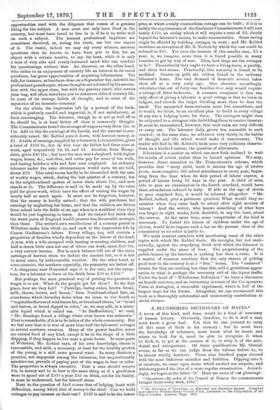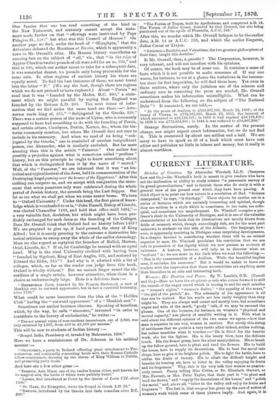A BLUNDERING DICTIONARY OF DATES.*
A BOOK of this kind, well done, would be a kind of summary of human history. Obviously, therefore, to do it well a man must know a great deal. Not that he can pretend to carry all this mass of facts in his memory ; but he must have the knowledge of reference, must know what he wants and where to look for it, must be able to recognize it when he finds it, to get at the essence of it, to strip it of the acci- dental and unimportant. Of these qualifications Mr. Overall seems, as far as we can judge from the volume before us, to be almost wholly destitute. These nine hundred pages abound with the most ludicrous mistakes and futilities. Dipping into it at intervals, we came upon items which excited our surprise, and which suggested the idea of a more regular examination. Accord- ingly, we began at the letter 'O.' Here are some of our gleanings :
"Ontsrloss—By order of the Council of Meacon the communicants brought theirs every week, 1582."
• The Dictionary of Chronology; or, Historical and Static:kat Register. Compiled
and edited by William Henry Overall, Librarian to the Corporation of Me City of London. London: Tegg. 1870.
One fancies that one has read something of the kind in the New Testament, and certainly cannot accept the state- ment made further on that " offerings were instituted by Pope
Pelagius II., 558;" but what was this Council of Meacon ? On another page we find, under the head of " CEnophyta," that the Athenians defeated the Bceotians at Bteotia, which is apparently a town in Mr. Overall's atlas. His Roman history contributes an amazing fact on the subject of "oil," viz., that "in the reign of Appius Claudius twelve pounds of oil were sold for an as, 505," and that in 680, which our author seems to take for a subsequent date, it was somewhat dearer, ten pounds only being procurable for the
same coin. In other regions of ancient history his views are equally novel. To find the best instances of these, we must travel into the letter " P." (We say the beat, though there are regions which we do not pretend to have explored.) About " Persia " we read that it was " founded by the Medea, B.C. 880," a state- ment which we might parallel by saying that England was founded by the Britons A.D. 200. The next items of infor- mation that we find under the same head are these Arta-
xerxes made king of, 235," "Subjugated by the Greeks, 238." There was a certain person of the name of Cyrus, who is commonly supposed to have had something to do with the founding of Persia, and certain others, Cambyses, Darius, Xerxes, &c., whom the his-
tories commonly mention, but whom Mr. Overall does not care to include in his summary. And when we read of its being " sub- jugated by the Greeks," one is reminded of another insignificant person, one Alexander, who is similarly excluded. But far more amazing than this is the article "Passover." Our author has possibly a prejudice against what is sometimes called "profane " history, but on this principle he ought to know something about that which is distinguished from it by the name of " sacred."
Well, of the " Passover," we are informed that it was "an his- torical and typical festival of the Jews, held in commemoration of the Destroying Angel passing over the houses of the Egyptians." After this
nothing can surprise us, and we accept with resignation the state- ment that seven passovers only were celebrated during the whole period of Jewish history, the seventh being the Last Supper. But let us see what we shall get when we come nearer home. We turn to " Oxford University." Under this head, the first piece of know- ledge which is vouchsafed to us is, "John Russell, Bishop of Lincoln, was elected Chancellor 1483, and held that office until 1494,"- a very valuable fact, doubtless, but which might have been pro- fitably exchanged for such dates as the founding of the Colleges. Does Mr. Overall think that Oxford had no history before 1483? We are prepared to give up, if hard pressed, the story of King Alfred ; but it is surely pressing to the extreme a destructive his- torical criticism to sweep away the whole of the earlier chronology.
Must we also regard as mytyical the founders of Balliol, Merton, Oriel, Lincoln, &c. ? If so, let Cambridge be treated with an equal hand. Why is the rival University credited with having been " founded by Sigebert, King of East Anglia, 631, and restored by Edward the Elder, 915" ? And why is it adorned with a list of colleges, which, as far as the reader can judge from this book, Oxford is wholly without? But we cannot linger round the ab- surdities of a single article, however attractive, when there is a choice so embarrassingly large. Here is a delicious item
3ignmssaast CLUB, founded by Sir Francis Dashwood, a sort of Monkish sect to outward appearance, but in fact a convivial fraternity, circa 1758."
What could be more humorous than the idea of the " Hellfire Club " having the " outward appearance" of a " Monkish sect"?
Sometimes our author becomes obscure. Speaking of benefices, which, by the way, he calls " sinecares," invented " in order to contribute to the luxury of ecclesiastics," he writes :—
" The net annual value of non-resident incumbents, out of 2,960, was only returned by 1,297, from £10 to £2,180 per annum."
This will be new to students of Indian history :-
"Bengal, India, Presidency of, invaded by Mahometan, 1206."
Here we have a reminiscence of Dr. Johnson in his satirical manner ORANGEMEN, a party in Ireland affecting great attachment to Pro- testantism, and continually concocting broils with their Roman Catholic fellow-countrymen, dressing up the statue of King William in Dublin, and promoting party feuds."
And here are a few other gems
EPHESUS, Asia Minor, one of the twelve Ionian cities, well known for its magical arts, the books of which were publicly burnt."
"LADIES, first introduced at Court by the Queen of Louis VII. about 1500."
" ST. 1■1aaa, the Evangelist, wrote his Gospel in Greek A.D. 26." "Dasciso, introduced by the Greeks into their comedies circa B.C. 1500."
"The Forum of Trajan, built by Apollodoras, and completed A.D. 14. The Forum of Julius Omar, founded by that General, the site being purchased out of the spoils of Pharsalia, A.U.O. 788."
After this, we wonder which Mr. Overall beliefes to be the earlier date, A.D. 14 or A.U.C. 788, and which the earlier Emperor, Julius Caesar or Trajan.
" Gnosnes—Basilides and Valentines, the two greatest philosophers of their time, taught this doctrine."
Is Mr. Overall, then, a gnostic ? The Corporation, however, is• very tolerant, and will not interfere with his opinions.
Of course, the book may be of some use. It contains a mass of facts which it is not possible to make nonsense of. If any one wants, for instance, to see at a glance the variations in the income-- tax since its first imposition, he will find them here. Yet even in
these matters, where only the judicious use of the scissors and ordinary care in correcting the press are needed, Mr. Overall- sometimes makes his information unintelligible. What can be understood from the following on the subject of "The National Debt"? It amounted, we are told,—
" At the peace of Amiens, to £520,207,101, March 25, 1802 ; at the treaty of Vienna, to £773,195,931, March 23, 1815, the interest of which amounted to £28,128,107; in 1818 it had reached £56,729,400;. in 1834 it was £773,234,401; in 1844 it was reduced to £18,407,300."
Strange fluctuations, surely. In the matter of the present charge, one might expect exact information, but we do not find it. This is overstated by about one million and a half. We are sorry to have to speak so ill of a book which must have cost editor and publisher no little in labour and money, but it really is. almost worthless.































 Previous page
Previous page